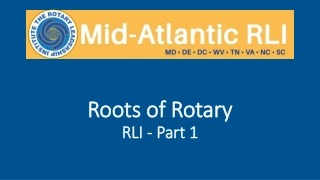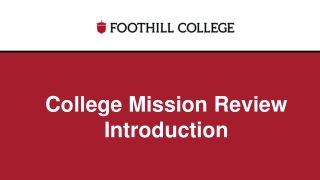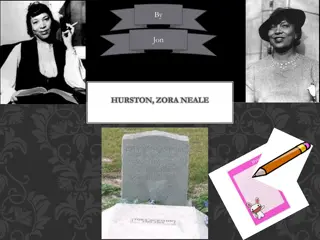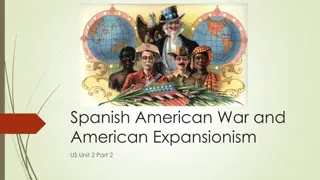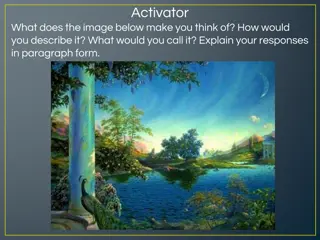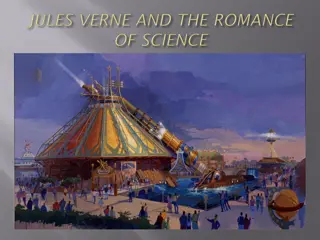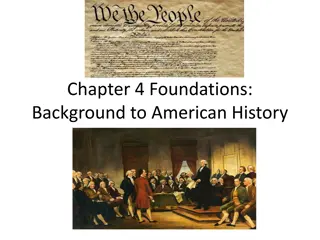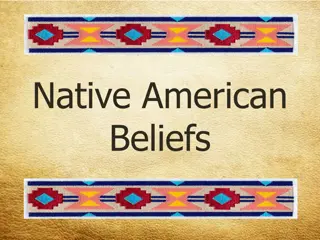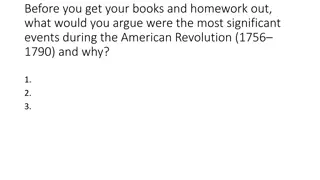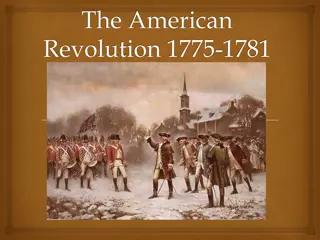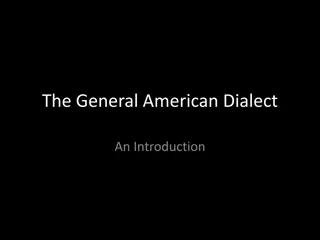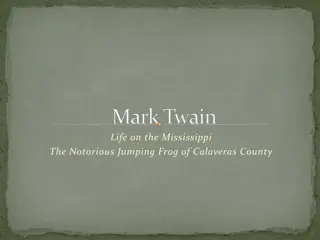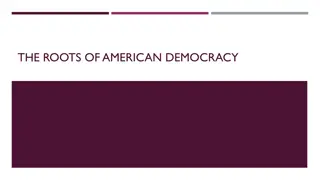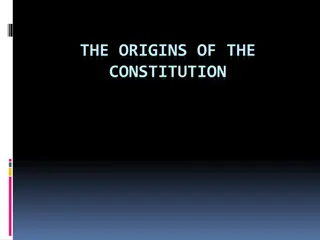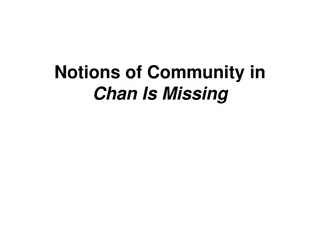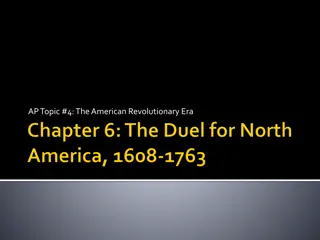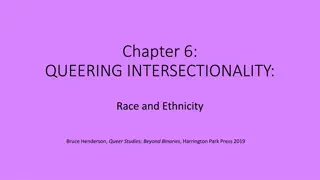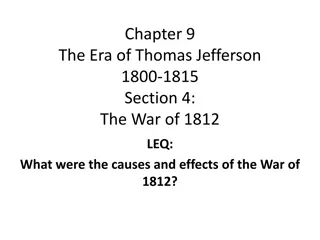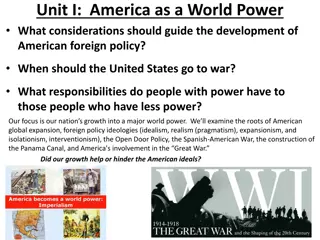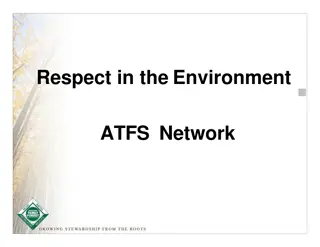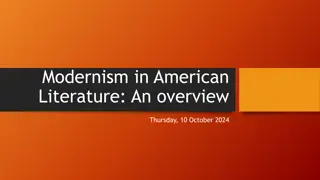Roots of Rotary
Explore Rotary's guiding principles, its rich history, and the importance of service in personal, community, and global settings. Discover the value of Rotary's ideals and how they impact individuals and communities.
0 views • 18 slides
The Anglo-Saxon Period: Migration and Integration in Angleland
The Anglo-Saxon period (c. 449-1066) in England saw a dynamic interplay of various cultures, including the Celts, Romans, and Germanic tribes. The arrival of Angles, Saxons, Jutes, and others led to the formation of Angleland (England), with societal structures based on heroic ideals like courage an
2 views • 20 slides
College Mission Review Introduction
College mission and vision statements play a crucial role in guiding institutional priorities, decision-making, and student success. Vision statements describe aspirational goals and ideals, while mission statements articulate what the institution does, why it does it, and who it serves. This conten
2 views • 18 slides
Liberty & The Age of Enlightenment The American Battlefield Trust
The Age of Enlightenment, with its emphasis on natural law, liberty, progress, and constitutional government, greatly influenced American thinking and the Revolutionary War. Key figures like John Locke and Sir William Blackstone contributed ideas of social contract and law that shaped American gover
2 views • 15 slides
Zora Neale Hurston: African-American Writer of the Harlem Renaissance
Zora Neale Hurston, born in Notasulga, Alabama, in 1891, was a prominent African-American writer known for her works reflecting the African-American culture and folklore. Growing up in Eatonville, Florida, and later studying at Barnard College, she stood out among her contemporaries for her portraya
2 views • 4 slides
Overview of AANAPISI Program in the United States
The Asian American and Native American Pacific Islander Serving Institutions (AANAPISI) Program aims to support institutions with a minimum of 10% Asian American and Native American Pacific Islander undergraduate enrollment. Currently, there are 54 funded AANAPISI institutions across 16 states and t
0 views • 13 slides
Ernest Hemingway: Iconic Writer of the Lost Generation
Ernest Miller Hemingway, born in Oak Park, Illinois, was a prominent writer of the Lost Generation. His experiences in World War I influenced his writing style, marked by simplicity and objectivity. Moving to Paris, he mingled with Modernist artists and revolutionized American fiction. The Lost Gene
2 views • 24 slides
Evolution of American English Vocabulary and Language Features
American English exhibits arachaic features and early changes in vocabulary due to colonial influences and the distinct political and administrative system. The language has preserved old-fashioned elements from the seventeenth and eighteenth centuries, while also incorporating new words inspired by
0 views • 5 slides
Exploring the Fascinating Architectural Style of Googie
Discover the origins and characteristics of Googie architecture, a modern style rooted in post-WWII American futurism. Learn how this unique style draws inspiration from Space Age ideals and revolutionized everyday buildings in the mid-20th century.
0 views • 17 slides
Spanish-American War and American Expansionism: A Look Back in History
Explore the causes and impacts of the Spanish-American War, including the influence of Yellow Journalism, nationalism, and imperialism on American expansionism during the late 1800s. Learn about key figures like Theodore Roosevelt and the Rough Riders, and the significance of policies like the Monro
0 views • 25 slides
Exploring Utopian Ideals through Imagery and Song
The concept of Utopia, an ideally perfect place or society, is explored through various images and songs. The imagery delves into the definition, concepts, religious and scientific connections, varieties, and the song "Imagine" by John Lennon reflects utopian ideals. The Black Eyed Peas' song "Where
0 views • 9 slides
Cultural Awareness for Drug Courts Working with Native American Participants
Understanding the cultural nuances of Native American communities is crucial for Drug Courts collaborating with Tribal Healing to Wellness Courts. This involves acknowledging tribal sovereignty, regional and cultural differences, customs, spirituality, and communication styles unique to American Ind
0 views • 22 slides
Native American Repatriation and NAGPRA Overview
The Native American Graves Protection and Repatriation Act (NAGPRA) enacted since November 1990 establishes ownership of cultural items excavated on Federal or Tribal land. It requires returning such items to Native American descendants and affiliated tribes. The Act also criminalizes trafficking in
1 views • 8 slides
Impact of the Industrial Revolution on Society and Ideals
The Industrial Revolution, spanning from 1760 to the late 1800s, revolutionized manufacturing, leading to improved living standards in the developed world. Mechanization, new energy sources, steam engines, and railways transformed production and transportation, fostering innovation. Despite the Fren
1 views • 15 slides
American Revolutionary Era: Key Events and Figures
The American Revolutionary Era marked by the formation of the Constitution, Washington's militia, key figures like Jonathan Trumbull and John Peter Muhlenberg, the emergence of American culture, the Articles of Confederation, and calls for a stronger government. This period saw a shift towards a mor
0 views • 17 slides
Exploring Native American Beliefs and Spiritual Practices
Delve into the rich tapestry of Native American beliefs, traditions, and spiritual practices, including their diverse worldviews, sacred connections to nature, and unique cultural expressions. Discover the origins of terms like "Indian" and the vast linguistic diversity among different Nations. Cont
3 views • 13 slides
A Comparative Analysis of the American and French Revolutions
The American and French Revolutions were significant events during the late 18th century. Both revolutions were driven by Enlightenment ideals, concern for liberty, and push for new governance but had differences in violence, outcomes, and influence. While the American Revolution led to independence
0 views • 9 slides
Washington Irving: Father of American Fiction and Pioneer of American Romanticism
Washington Irving, an influential American author of the early 19th century, is revered as the Father of American fiction. Known for iconic works like "The Legend of Sleepy Hollow" and "Rip Van Winkle," Irving played a crucial role in establishing American literature as an independent art form. His
1 views • 14 slides
The American Revolution: Causes and Events
The Age of Revolutions in the late 18th century saw the American Revolution unfold, driven by factors like Enlightenment ideals, taxation disputes, and events like the Boston Massacre and Tea Party. The British government's actions and the formation of the First Continental Congress in 1774 further
0 views • 43 slides
Overview of the General American Dialect
The General American Dialect, also known as GenAm, is a widely preferred dialect of English characterized by minor differences in pronunciation compared to regional American accents. It is distinct from Southern, Midwestern, and Northeastern accents and is one of the two global English dialects alon
0 views • 13 slides
Mark Twain's Humorous Tales and Regionalism in American Literature
Mark Twain, a master of humor and regionalism, depicted American culture in a distinctive way through his works such as "The Notorious Jumping Frog of Calaveras County" and "Life on the Mississippi." His stories showcase exaggerated characters, humorous situations, and unique dialects, reflecting th
0 views • 8 slides
Exploring Democracy, Government Ideals, and Global Impact: A Comprehensive Analysis
Delve into the roots of American democracy, government ideals, and political scenarios in the Middle East and North Africa. Analyze the impact of the Arab Spring, U.S. responses, and Trump's immigration ban within the region. Reflect on governmental structures, revolutions, and foreign policy implic
0 views • 76 slides
The Path to American Independence: Constitution, Revolution, and Ideals
Explore the historical journey of America's independence, from the origins of the constitution and the road to revolution, to declaring independence and the influence of English heritage on American ideals. Discover the key roles of figures like John Locke and Thomas Jefferson, and how the American
0 views • 29 slides
American History Curriculum for Grade 11 - Semester 1
This American history curriculum for Grade 11 Semester 1 covers key topics such as the Declaration of Independence, American Revolution, industrialization, urbanization, immigration, imperialism, and the United States' emergence as a world power. Students will examine diverse aspects of American his
0 views • 11 slides
Unit Assessment Review: U.S. Imperialism History Lesson
Review session for upcoming history unit assessment on U.S. Imperialism. Topics covered include key events such as the Philippines under American control, reasons for Mark Twain's anti-Imperialist stance, factors driving American foreign policy towards imperialism, the case of Hawaii's Queen Liliuok
0 views • 15 slides
Exploring Asian American Identity Through "Chan Is Missing" by Wayne Wang
Chan Is Missing" (1982) directed by Wayne Wang is a groundbreaking Asian American independent feature film that delves into themes of Asian American identity, hyphenated identity, assimilation, and hybridity. The film, shot on a shoestring budget in San Francisco's Chinatown, showcases the community
0 views • 26 slides
The American Revolutionary Era Overview
The American Revolutionary Era marked a period of intense rivalry between France, England, and Spain for control of North America, leading to conflicts like the French & Indian War. Key events such as the founding of Quebec, exploration by Robert de La Salle, and establishment of New Orleans shaped
0 views • 39 slides
Nurturing American Ideals in Civic Education for Classroom Discussions
Emphasizing American ideals in civic education can provide a non-partisan foundation for teaching about elections, fostering civil discourse, and maintaining a positive school environment. By focusing on founding documents and unity, teachers can guide students towards civic literacy and meaningful
0 views • 9 slides
Nationalist Revolutions in Latin America: 1789-1900
Rising nationalism in Latin America during the late 1700s and early 1800s led to revolutions against European colonial powers. Inspired by Enlightenment ideals and events such as the American and French Revolutions, Latin Americans sought self-government and independence. The Haitian Revolution in 1
1 views • 28 slides
Influence of American Culture on American Christianity: A Critical Analysis
This content explores the relationship between American culture and American Christianity, discussing how religion reflects the cultural values of individualism, optimism, and the concept of a blessed nation. It delves into the concept of Biblical individualism, the influence of prosperity gospel, a
1 views • 7 slides
Exploring Queer Identities in Native American and African-American Communities
Delve into the nuanced intersections of race, ethnicity, and queerness within Native American and African-American communities. From the reclaiming of Two-Spirit identities to the presence of queer writers in literary spaces, this exploration sheds light on the complexities of identity, resistance t
0 views • 38 slides
The War of 1812: Causes, Events, and Effects
The War of 1812 was influenced by issues such as British impressment of American sailors, arming Native Americans, and trade restrictions. Despite opposition, President James Madison declared war in 1812. The conflict marked a period of American nationalism, with War Hawks pushing for war and Doves
0 views • 16 slides
American Evolution: From Global Power to Domestic Transformation
Explore American foreign policy, the impact of global conflicts, and domestic changes from the late 19th to the mid-20th century. Delve into policymaking, wartime decisions, societal shifts, and the nation's development as a superpower, assessing the alignment with founding ideals amidst global chal
0 views • 5 slides
Promoting Respectful and Safe Environments in the American Forest Foundation
This content highlights the importance of maintaining a respectful and safe environment, particularly within the American Forest Foundation and the American Tree Farm System. It emphasizes understanding and appreciating the distinguishing characteristics of individuals, recognizing and addressing ha
0 views • 35 slides
American Literature Through the Ages
Explore the rich tapestry of American literature covering American Indian culture, New England Puritanism, the 18th century American Enlightenment, and the American Renaissance. Discover the oral traditions of American Indian tribes, the puritanical values of New England, the democratic origins of A
0 views • 17 slides
The Progressive Era: Roosevelt's Impact on the Modern Presidency
Theodore Roosevelt's presidency marked a significant shift towards Progressive ideals, shaping the way Americans viewed the government. From his early life to his Square Deal reform program, Roosevelt's dynamic leadership and dedication to fighting corruption left a lasting impact on American politi
0 views • 17 slides
Evolution of Modernism in American Literature: An Overview
The modern world between the two World Wars brought a shift towards modernism in American literature, exploring themes like the disconnect between new cities and pioneer ideals, the lost generation post-wars, and societal changes. Manifest Destiny, realism, experimentalism, and innovation also influ
0 views • 9 slides
Evolution of Generational Ideals in Visual Representation
Explore the transformation of societal ideals from the Victorian era to the 1920s through thought-provoking images, portraying the transition of women from old to new stereotypes. Reflect on intergenerational perceptions and complaints between teenagers and older generations in "Kids These Days!" im
0 views • 6 slides
I have a dream… OMAM
Explore the importance of dreams in John Steinbeck's novels with a focus on the American Dream. Understand how Steinbeck uses dreams to depict societal changes in the USA during the 1930s, emphasizing the shift away from old ideals. Learn how to structure your essay effectively and engage with the c
0 views • 12 slides
Cardio-metabolic Abnormalities Among Normal Weight Individuals: A Cross-sectional Analysis of Race/Ethnicity in the U.S.
Overweight and obesity are known cardio-metabolic risk factors, but this study delves into abnormalities among normal-weight individuals. The research compares data from MESA and MASALA studies, including diverse race/ethnicity groups like White, African American, Hispanic American, Chinese American
1 views • 23 slides
